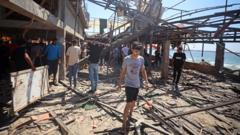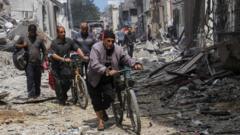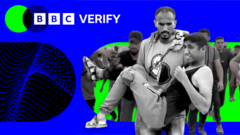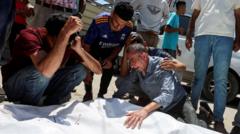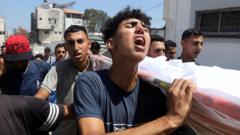In the wake of Sudan's civil war, Alawia Babiker Ahmed recounts her traumatic escape from el-Fasher to Tawila, where she lost a baby, rescued a child, and faced armed gangs and airstrikes.
Amidst Chaos: A Harrowing Journey in Sudan's Civil War

Amidst Chaos: A Harrowing Journey in Sudan's Civil War
Alawia Babiker Ahmed’s story highlights the struggles of Sudanese families as they escape violence and loss in Darfur.
In the ongoing turmoil of Sudan's civil war, individuals like 19-year-old Alawia Babiker Ahmed embody the resilience and suffering experienced by many. Recently fleeing the war-torn region of Darfur, Alawia described the harrowing journey she undertook on foot over three days, covering roughly 70 kilometers (45 miles) from el-Fasher to Tawila. In the brutality of the situation, she suffered a miscarriage while navigating through airstrikes and militia threats, all too aware that others faced worse fates along the route.
As Alawia's family fled the relentless conflict, they stumbled upon an infant abandoned on the roadside, his mother tragically deceased. "We covered the mother and kept going," Alawia recounted to BBC. Despite the overwhelming agony of her situation, including the physical pain from her earlier miscarriage, she demonstrated compassion by taking the child with them.
Since April 2023, when hostilities erupted between the Sudanese army and the Rapid Support Forces (RSF), the country has descended into a humanitarian crisis unprecedented in scale. Over 12 million people have been displaced, with regions like Darfur being particularly affected. The RSF has gained control over much of this area, while el-Fasher remains under army influence, facing significant bombardment that marks the struggle for territorial dominance.
Accompanying Alawia, her brother Marwan Mohamed Adam, 21, described a traumatic encounter with RSF-affiliated gangs, who assaulted him while robbing him of his meager possessions. Fearing for his life, he had to fabricate his origin to escape execution, as young men from el-Fasher were often targeted.
As the family pressed onward, they encountered the stark reality of death and despair. Khadija Ismail Ali, another displaced individual, shared stories of her family's harrowing loss, with reports of relatives killed during airstrikes and children succumbing to thirst in transit. Alawia noted the alarming number of bodies "scattered all over the streets," an image reflecting the chaos enveloping Darfur.
With dwindling supplies, the family set out at night, driven by the hope of finding water in a nearby village. Instead, they were met with hostility from RSF fighters, who seized the little money they had left, leaving them empty-handed and without any source of hydration.
The ordeal didn't end there. Their search for relief took them to el-Koweim village, where RSF fighters controlled access to the water supply. Despite pleading cries for help, the fighters offered no mercy, and the desperate family continued their trek until they finally reached Tawila, where Alawia collapsed from exhaustion.
Once in Tawila, the family received medical care, but the questions of their future loomed large. While they were taken in by a local family, the uncertainty of what lies ahead in a nation plagued by instability continues to weigh on them. Marwan expressed a desire to seek a new life abroad, a path many Sudanese have resorted to amid a devastating conflict that offers little indication of resolution.
Despite the overwhelming challenges, Alawia’s story serves as a poignant reminder of the resilience of individuals navigating the complexities of war. In the face of horrific loss and immense hardship, her journey exemplifies the broader struggles faced by countless families caught in the crossfire of civilization’s darkest moments in Sudan.
As Alawia's family fled the relentless conflict, they stumbled upon an infant abandoned on the roadside, his mother tragically deceased. "We covered the mother and kept going," Alawia recounted to BBC. Despite the overwhelming agony of her situation, including the physical pain from her earlier miscarriage, she demonstrated compassion by taking the child with them.
Since April 2023, when hostilities erupted between the Sudanese army and the Rapid Support Forces (RSF), the country has descended into a humanitarian crisis unprecedented in scale. Over 12 million people have been displaced, with regions like Darfur being particularly affected. The RSF has gained control over much of this area, while el-Fasher remains under army influence, facing significant bombardment that marks the struggle for territorial dominance.
Accompanying Alawia, her brother Marwan Mohamed Adam, 21, described a traumatic encounter with RSF-affiliated gangs, who assaulted him while robbing him of his meager possessions. Fearing for his life, he had to fabricate his origin to escape execution, as young men from el-Fasher were often targeted.
As the family pressed onward, they encountered the stark reality of death and despair. Khadija Ismail Ali, another displaced individual, shared stories of her family's harrowing loss, with reports of relatives killed during airstrikes and children succumbing to thirst in transit. Alawia noted the alarming number of bodies "scattered all over the streets," an image reflecting the chaos enveloping Darfur.
With dwindling supplies, the family set out at night, driven by the hope of finding water in a nearby village. Instead, they were met with hostility from RSF fighters, who seized the little money they had left, leaving them empty-handed and without any source of hydration.
The ordeal didn't end there. Their search for relief took them to el-Koweim village, where RSF fighters controlled access to the water supply. Despite pleading cries for help, the fighters offered no mercy, and the desperate family continued their trek until they finally reached Tawila, where Alawia collapsed from exhaustion.
Once in Tawila, the family received medical care, but the questions of their future loomed large. While they were taken in by a local family, the uncertainty of what lies ahead in a nation plagued by instability continues to weigh on them. Marwan expressed a desire to seek a new life abroad, a path many Sudanese have resorted to amid a devastating conflict that offers little indication of resolution.
Despite the overwhelming challenges, Alawia’s story serves as a poignant reminder of the resilience of individuals navigating the complexities of war. In the face of horrific loss and immense hardship, her journey exemplifies the broader struggles faced by countless families caught in the crossfire of civilization’s darkest moments in Sudan.

